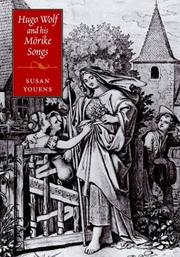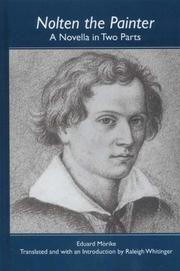| Listing 1 - 2 of 2 |
Sort by
|

ISBN: 052165159X 0521027195 1107117127 0511173350 0511152418 0511327501 0511481977 1280420588 051104805X 9780511481970 0511019262 9780511019265 051103282X 9780511032820 9780511152412 9780521651592 9786610420582 6610420580 9780511048050 Year: 2000 Publisher: Cambridge : Cambridge University Press,
Abstract | Keywords | Export | Availability | Bookmark
 Loading...
Loading...Choose an application
- Reference Manager
- EndNote
- RefWorks (Direct export to RefWorks)
Viennese composer Hugo Wolf produced one of the most important song collections of the nineteenth century when he set to music fifty-three poems by the great German poet Eduard Mörike. Susan Youens reappraises this singular collaboration to shed new light on the sophisticated interplay between poetry and music in the songs. Wolf is customarily described as 'the Poet's Composer', someone who revered poetry and served it faithfully in his music. Yet, as Youens reveals, this cliché overlooks the rich terrain in which his songs are often at cross purposes with his chosen poetry. Although Wolf did much to draw the world's attention to the neglected Swabian poet, his musical interpretation of the poetry was also influenced by his own life, psychology and experiences. This book examines selected Mörike songs in detail, demonstrating that the poems and music each have their own distinctive stories which at times intersect but also diverge.
Mörike, Eduard Friedrich, --- Wolf, Hugo, --- Musical settings --- History and criticism. --- Mörike, Eduard, --- Mërike, Ė., --- Molike, Aidehua, --- Möricke, Eduard, --- Wolf, Hugo --- Mörike, Eduard, Friedrich --- History and criticism --- Duitsland --- 19e eeuw --- Liederen

ISBN: 1281741361 9786611741365 1571136665 1571133127 Year: 2005 Publisher: Suffolk : Boydell & Brewer,
Abstract | Keywords | Export | Availability | Bookmark
 Loading...
Loading...Choose an application
- Reference Manager
- EndNote
- RefWorks (Direct export to RefWorks)
When one thinks of German artist-novels and 'Bildungsromane,' works long available in translation come to mind-by Goethe, Novalis, Hoffmann, Stifter, Keller, or more recently by Mann, Kafka, Musil, or Grass. Yet Eduard Mörike's provocatively subtitled 'Maler Nolten: Novelle in zwei Teilen' (Nolten the Painter: A Novella in Two Parts, 1832) has remained neglected and misunderstood, and until now has never been translated into English, despite its obvious ties to other artist-novels and its striking modernity in playing with conventions of narrative authority and heroic identity. Witness the subtle irony of the opening sequence, in which the narrator is subverted by hints at his own clumsiness and intimations about the dire truths that lurk behind the protagonist Nolten's relationships to his male friends and to the seductive yet somehow frightening women in his life. Or the interplay between the narrator's attempts to make sense of Nolten's complex inner motivations in his loves and art and the ludicrously pompous pathos with which Nolten persists in speaking and thinking, as he concocts a heroic persona caught up in passion, intrigue, and tragedy. Fascinating too is the mysterious trail of the 'Grenzgänger,' or border-line characters, with their hints at the dimension of 'Gypsies, Tramps, and Thieves' that seems to threaten and at the same time to foster the complex unfolding of the realities of life and art that defy Nolten's all-too-artful 'mastery.' Raleigh Whitinger is professor in the Department of Germanic Languages at the University of Alberta.
Bildungsromans, German. --- German Bildungsromans --- German fiction --- Mörike, Eduard, --- Mërike, Ė., --- Molike, Aidehua, --- Möricke, Eduard, --- LITERARY CRITICISM / General. --- Bildungsromane. --- Eduard Mörike. --- German Artist-Novel. --- Gypsies. --- Heroic Identity. --- Narrative Authority. --- Raleigh Whitinger. --- Thieves. --- Tramps.
| Listing 1 - 2 of 2 |
Sort by
|

 Search
Search Feedback
Feedback About
About Help
Help News
News